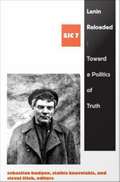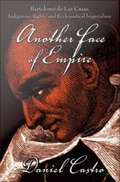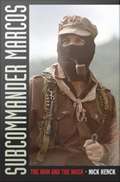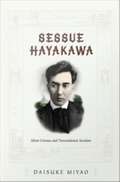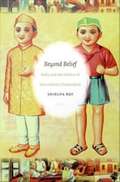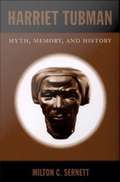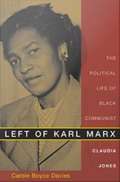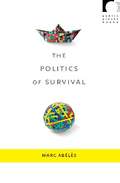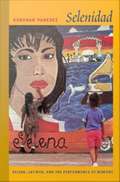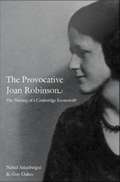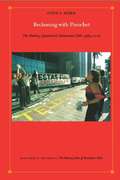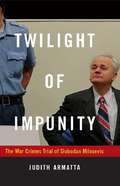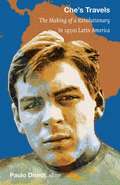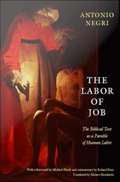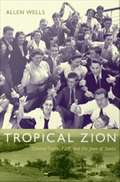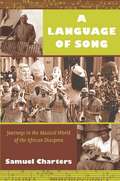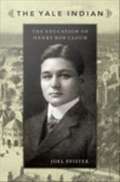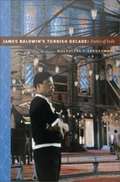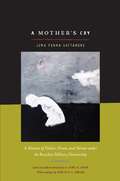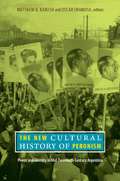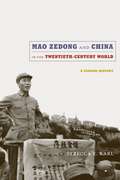- Table View
- List View
Lenin Reloaded: Toward a Politics of Truth
by Slavoj I Ek Sebastian Budgen Stathis KouvelakisLenin Reloaded is a rallying call by some of the world's leading Marxist intellectuals for renewed attention to the significance of Vladimir Lenin. The volume's editors explain that it was Lenin who made Karl Marx's thought explicitly political, who extended it beyond the confines of Europe, who put it into practice. They contend that a focus on Lenin is urgently needed now, when global capitalism appears to be the only game in town, the liberal-democratic system seems to have been settled on as the optimal political organization of society, and it has become easier to imagine the end of the world than a modest change in the mode of production. Lenin retooled Marx's thought for specific historical conditions in 1914, and Lenin Reloaded urges a reinvention of the revolutionary project for the present. Such a project would be Leninist in its commitment to action based on truth and its acceptance of the consequences that follow from action. These essays, some of which are appearing in English for the first time, bring Lenin face-to-face with the problems of today, including war, imperialism, the imperative to build an intelligentsia of wage earners, the need to embrace the achievements of bourgeois society and modernity, and the widespread failure of social democracy. Lenin Reloaded demonstrates that truth and partisanship are not mutually exclusive as is often suggested. Quite the opposite--in the present, truth can be articulated only from a thoroughly partisan position. Contributors. Kevin B. Anderson, Alain Badiou, Etienne Balibar, Daniel Bensad, Sebastian Budgen, Alex Callinicos, Terry Eagleton, Fredric Jameson, Stathis Kouvelakis, Georges Labica, Sylvain Lazarus, Jean-Jacques Lecercle, Lars T. Lih, Domenico Losurdo, Savas Michael-Matsas, Antonio Negri, Alan Shandro, Slavoj Žižek
Another Face of Empire: Bartolomé de Las Casas, Indigenous Rights, and Ecclesiastical Imperialism
by Daniel CastroThe Spanish cleric Bartolom de Las Casas is a key figure in the history of Spain's conquest of the Americas. Las Casas condemned the torture and murder of natives by the conquistadores in reports to the Spanish royal court and in tracts such as A Short Account of the Destruction of the Indies (1552). For his unrelenting denunciation of the colonialists' atrocities, Las Casas has been revered as a noble protector of the Indians and as a pioneering anti-imperialist. He has become a larger-than-life figure invoked by generations of anticolonialists in Europe and Latin America. Separating historical reality from myth, Daniel Castro provides a nuanced, revisionist assessment of the friar's career, writings, and political activities. Castro argues that Las Casas was very much an imperialist. Intent on converting the Indians to Christianity, the religion of the colonizers, Las Casas simply offered the natives another face of empire: a paternalistic, ecclesiastical imperialism. Castro contends that while the friar was a skilled political manipulator, influential at what was arguably the world's most powerful sixteenth-century imperial court, his advocacy on behalf of the natives had little impact on their lives. Analyzing Las Casas's extensive writings, Castro points out that in his many years in the Americas, Las Casas spent very little time among the indigenous people he professed to love, and he made virtually no effort to learn their languages. He saw himself as an emissary from a superior culture with a divine mandate to impose a set of ideas and beliefs on the colonized. He differed from his compatriots primarily in his antipathy to violence as the means for achieving conversion.
Subcommander Marcos: The Man and the Mask
by Nick HenckSubcommander Marcos made his debut on the world stage on January 1, 1994, the day the North American Free Trade Agreement took effect. At dawn, from a town-hall balcony he announced that the Zapatista Army of National Liberation had seized several towns in the Mexican state of Chiapas in rebellion against the government; by sunset Marcos was on his way to becoming the most famous guerrilla leader since Che Guevara. Subsequently, through a succession of interviews, communiqus, and public spectacles, the Subcommander emerged as a charismatic spokesperson for the indigenous Zapatista uprising and a rallying figure in the international anti-globalization movement. In this, the first English-language biography of Subcommander Marcos, Nick Henck describes the thought, leadership, and personality of this charismatic rebel spokesperson. He traces Marcos's development from his provincial middle-class upbringing, through his academic career and immersion in the clandestine world of armed guerrillas, to his emergence as the iconic Subcommander. Henck reflects on what motivated an urbane university professor to reject a life of comfort in Mexico City in favor of one of hardship as a guerrilla in the mountainous jungles of Chiapas, and he examines how Marcos became a conduit through which impoverished indigenous Mexicans could communicate with the world. Henck fully explores both the rebel leader's renowned media savvy and his equally important flexibility of mind. He shows how Marcos's speeches and extensive writings demonstrate not only the Subcommander's erudition but also his rejection of Marxist dogmatism. Finally, Henck contextualizes Marcos, locating him firmly within the Latin American guerrilla tradition.
Sessue Hayakawa: Silent Cinema and Transnational Stardom
by Daisuke MiyaoWhile the actor Sessue Hayakawa (1886-1973) is perhaps best known today for his Oscar-nominated turn as a Japanese military officer in The Bridge on the River Kwai (1957), in the early twentieth century he was an internationally renowned silent film star, as recognizable as Charlie Chaplin or Douglas Fairbanks. In this critical study of Hayakawa's stardom, Daisuke Miyao reconstructs the Japanese actor's remarkable career, from the films that preceded his meteoric rise to fame as the star of Cecil B. DeMille's The Cheat (1915) through his reign as a matinee idol and the subsequent decline and resurrection of his Hollywood fortunes. Drawing on early-twentieth-century sources in both English and Japanese, including Japanese-language newspapers in the United States, Miyao illuminates the construction and reception of Hayakawa's stardom as an ongoing process of cross-cultural negotiation. Hayakawa's early work included short films about Japan that were popular with American audiences as well as spy films that played upon anxieties about Japanese nationalism. The Jesse L. Lasky production company sought to shape Hayakawa's image by emphasizing the actor's Japanese traits while portraying him as safely assimilated into U. S. culture. Hayakawa himself struggled to maintain his sympathetic persona while creating more complex Japanese characters that would appeal to both American and Japanese audiences. The star's initial success with U. S. audiences created ambivalence in Japan, where some described him as traitorously Americanized and others as a positive icon of modernized Japan. This unique history of transnational silent-film stardom focuses attention on the ways that race, ethnicity, and nationality influenced the early development of the global film industry.
Beyond Belief: India and the Politics of Postcolonial Nationalism
by Srirupa RoyBeyond Belief is a bold rethinking of the formation and consolidation of nation-state ideologies. Analyzing India during the first two decades following its foundation as a sovereign nation-state in 1947, Srirupa Roy explores how nationalists are turned into nationals, subjects into citizens, and the colonial state into a sovereign nation-state. Roy argues that the postcolonial nation-state is consolidated not, as many have asserted, by efforts to imagine a shared cultural community, but rather by the production of a recognizable and authoritative identity for the state. This project--of making the state the entity identified as the nation's authoritative representative--emphasizes the natural cultural diversity of the nation and upholds the state as the sole unifier or manager of the "naturally" fragmented nation; the state is unified through diversity. Roy considers several different ways that identification with the Indian nation-state was produced and consolidated during the 1950s and 1960s. She looks at how the Films Division of India, a state-owned documentary and newsreel production agency, allowed national audiences to "see the state"; how the "unity in diversity" formation of nationhood was reinforced in commemorations of India's annual Republic Day; and how the government produced a policy discourse claiming that scientific development was the ultimate national need and the most pressing priority for the state to address. She also analyzes the fate of the steel towns--industrial townships built to house the workers of nationalized steel plants--which were upheld as the exemplary national spaces of the new India. By prioritizing the role of actual manifestations of and encounters with the state, Roy moves beyond theories of nationalism and state formation based on collective belief.
Harriet Tubman: Myth, Memory, and History
by Milton C. SernettHarriet Tubman is one of America's most beloved historical figures, revered alongside luminaries including Abraham Lincoln and Frederick Douglass. Harriet Tubman: Myth, Memory, and History tells the fascinating story of Tubman's life as an American icon. The distinguished historian Milton C. Sernett compares the larger-than-life symbolic Tubman with the actual "historical" Tubman. He does so not to diminish Tubman's achievements but rather to explore the interplay of history and myth in our national consciousness. Analyzing how the Tubman icon has changed over time, Sernett shows that the various constructions of the "Black Moses" reveal as much about their creators as they do about Tubman herself. Three biographies of Harriet Tubman were published within months of each other in 2003-04; they were the first book-length studies of the "Queen of the Underground Railroad" to appear in almost sixty years. Sernett examines the accuracy and reception of these three books as well as two earlier biographies first published in 1869 and 1943. He finds that the three recent studies come closer to capturing the "real" Tubman than did the earlier two. Arguing that the mythical Tubman is most clearly enshrined in stories told to and written for children, Sernett scrutinizes visual and textual representations of "Aunt Harriet" in children's literature. He looks at how Tubman has been portrayed in film, painting, music, and theater; in her Maryland birthplace; in Auburn, New York, where she lived out her final years; and in the naming of schools, streets, and other public venues. He also investigates how the legendary Tubman was embraced and represented by different groups during her lifetime and at her death in 1913. Ultimately, Sernett contends that Harriet Tubman may be America's most malleable and resilient icon.
Left of Karl Marx: The Political Life of Black Communist Claudia Jones
by Carole Boyce DaviesIn Left of Karl Marx, Carole Boyce Davies assesses the activism, writing, and legacy of Claudia Jones (1915-1964), a pioneering Afro-Caribbean radical intellectual, dedicated communist, and feminist. Jones is buried in London's Highgate Cemetery, to the left of Karl Marx--a location that Boyce Davies finds fitting given how Jones expanded Marxism-Leninism to incorporate gender and race in her political critique and activism. Claudia Cumberbatch Jones was born in Trinidad. In 1924, she moved to New York, where she lived for the next thirty years. She was active in the Communist Party from her early twenties onward. A talented writer and speaker, she traveled throughout the United States lecturing and organizing. In the early 1950s, she wrote a well-known column, "Half the World," for the Daily Worker. As the U. S. government intensified its efforts to prosecute communists, Jones was arrested several times. She served nearly a year in a U. S. prison before being deported and given asylum by Great Britain in 1955. There she founded The West Indian Gazette and Afro-Asian Caribbean News and the Caribbean Carnival, an annual London festival that continues today as the Notting Hill Carnival. Boyce Davies examines Jones's thought and journalism, her political and community organizing, and poetry that the activist wrote while she was imprisoned. Looking at the contents of the FBI file on Jones, Boyce Davies contrasts Jones's own narration of her life with the federal government's. Left of Karl Marx establishes Jones as a significant figure within Caribbean intellectual traditions, black U. S. feminism, and the history of communism.
The Postcolonial Careers of Santha Rama Rau
by Antoinette BurtonSantha Rama Rau was one of the best known South Asian writers in postwar America. Born into India's elite in 1923, Rama Rau has lived in the United States since the 1940s. Although she is no longer well known, she was for several decades a popular expert on India. She provided an insider's view of Indian cultures, traditions, and history to an American public increasingly aware of the expanded role of the United States on the world stage. Between 1945 and 1970, Rama Rau published half a dozen books, including travelogues, novels, a memoir, and a Time-Life cookbook; she was a regular contributor to periodicals such as the New Yorker, the New York Times, McCall's, and Reader's Digest. Drawing on archival research and interviews with Rama Rau, historian Antoinette Burton opens Rama Rau's career into an examination of orientalism in the postwar United States, the changing idioms of cosmopolitanism in the postcolonial era, and the afterlife of British colonialism in the American public sphere. Burton describes how Rama Rau's career was shaped by gendered perceptions of India and "the East" as well as by the shifting relationships between the United States, India, Pakistan, and Great Britain during the Cold War. Exploring how Rama Rau positioned herself as an expert on both India and the British empire, Burton analyzes the correspondence between Rama Rau and her Time-Life editors over the contents of her book The Cooking of India (1969), and Rama Rau's theatrical adaptation of E. M. Forster's A Passage to India, which played on Broadway in 1961 and was the basis for David Lean's 1985 film. Burton assesses the critical reception of Rama Rau's play as well as her correspondence with Forster and Lean.
FDR and the Spanish Civil War: Neutrality and Commitment in the Struggle that Divided America
by Dominic TierneyWhat was the relationship between President Franklin D. Roosevelt, architect of America's rise to global power, and the 1936-39 Spanish Civil War, which inspired passion and sacrifice, and shaped the road to world war? While many historians have portrayed the Spanish Civil War as one of Roosevelt's most isolationist episodes, Dominic Tierney argues that it marked the president's first attempt to challenge fascist aggression in Europe. Drawing on newly discovered archival documents, Tierney describes the evolution of Roosevelt's thinking about the Spanish Civil War in relation to America's broader geopolitical interests, as well as the fierce controversy in the United States over Spanish policy. Between 1936 and 1939, Roosevelt's perceptions of the Spanish Civil War were transformed. Initially indifferent toward which side won, FDR became an increasingly committed supporter of the leftist government. He believed that German and Italian intervention in Spain was part of a broader program of fascist aggression, and he worried that the Spanish Civil War would inspire fascist revolutions in Latin America. In response, Roosevelt tried to send food to Spain as well as illegal covert aid to the Spanish government, and to mediate a compromise solution to the civil war. However unsuccessful these initiatives proved in the end, they represented an important stage in Roosevelt's emerging strategy to aid democracy in Europe.
W Stands for Women: How the George W. Bush Presidency Shaped a New Politics of Gender
by Michaele L. Ferguson Lori Jo MarsoTaking seriously the "W Stands for Women" rhetoric of the 2004 Bush-Cheney campaign, the contributors to this collection investigate how "W" stands for women. They argue that George W. Bush has hijacked feminist language toward decidedly antifeminist ends; his use of feminist rhetoric is deeply and problematically connected to a conservative gender ideology. While it is not surprising that conservative views about gender motivate Bush's stance on so-called "women's issues" such as abortion, what is surprising--and what this collection demonstrates--is that a conservative gender ideology also underlies a range of policies that do not appear explicitly related to gender, most notably foreign and domestic policies associated with the post-9/11 security state. Any assessment of the lasting consequences of the Bush presidency requires an understanding of the gender conservatism at its core. In W Stands for Women ten feminist scholars analyze various aspects of Bush's persona, language, and policy to show how his administration has shaped a new politics of gender. One contributor points out the shortcomings of "compassionate conservatism," a political philosophy that requires a weaker class to be the subject of compassion. Another examines Lynndie England's participation in the abuse of prisoners at Abu Ghraib in relation to the interrogation practices elaborated in the Army Field Manual, practices that often entail "feminizing" detainees by stripping them of their masculine gender identities. Whether investigating the ways that Bush himself performs masculinity or the problems with discourse that positions non-Western women as supplicants in need of saving, these essays highlight the far-reaching consequences of the Bush administration's conflation of feminist rhetoric, conservative gender ideology, and neoconservative national security policy. Contributors. Andrew Feffer, Michaele L. Ferguson, David S. Gutterman, Mary Hawkesworth, Timothy Kaufman-Osborn, Lori Jo Marso, Danielle Regan, R. Claire Snyder, Iris Marion Young, Karen Zivi Michaela Ferguson and Karen Zivi appeared on KPFA's Against the Grain on September 11, 2007. Listen to the audio. Michaela Ferguson and Lori Jo Marso appeared on WUNC's The State of Things on August 30, 2007. Listen to the audio.
The Politics of Survival
by Marc AbélésIn this provocative analysis of global politics, the anthropologist Marc Abls argues that the meaning and aims of political action have radically changed in the era of globalization. As dangers such as terrorism and global warming have moved to the fore of global consciousness, foreboding has replaced the belief that tomorrow will be better than today. Survival, outlasting the uncertainties and threats of a precarious future, has supplanted harmonious coexistence as the primary goal of politics. Abls contends that this political reorientation has changed our priorities and modes of political action, and generated new debates and initiatives. The proliferation of supranational and transnational organizations--from the European Union to the World Trade Organization (WTO) to Oxfam--is the visible effect of this radical transformation in our relationship to the political realm. Areas of governance as diverse as the economy, the environment, and human rights have been partially taken over by such agencies. Non-governmental organizations in particular have become linked with the mindset of risk and uncertainty; they both reflect and help produce the politics of survival. Abls examines the new global politics, which assumes many forms and is enacted by diverse figures with varied sympathies: the officials at meetings of the WTO and the demonstrators outside them, celebrity activists, and online contributors to international charities. He makes an impassioned case that our accounts of globalization need to reckon with the preoccupations and affiliations now driving global politics. The Politics of Survival was first published in France in 2006. This English-language edition has been revised and includes a new preface.
Selenidad: Selena, Latinos, and the Performance of Memory
by Deborah ParedezAn outpouring of memorial tributes and public expressions of grief followed the death of the Tejana recording artist Selena Quintanilla Prez in 1995. The Latina superstar was remembered and mourned in documentaries, magazines, websites, monuments, biographies, murals, look-alike contests, musicals, drag shows, and more. Deborah Paredez explores the significance and broader meanings of this posthumous celebration of Selena, which she labels "Selenidad. " She considers the performer's career and emergence as an icon within the political and cultural transformations in the United States during the 1990s, a decade that witnessed a "Latin explosion" in culture and commerce alongside a resurgence of anti-immigrant discourse and policy. Paredez argues that Selena's death galvanized Latina/o efforts to publicly mourn collective tragedies (such as the murders of young women along the U. S. -Mexico border) and to envision a brighter future. At the same time, reactions to the star's death catalyzed political jockeying for the Latino vote and corporate attempts to corner the Latino market. Foregrounding the role of performance in the politics of remembering, Paredez unravels the cultural, political, and economic dynamics at work in specific commemorations of Selena. She analyzes Selena's final concert, the controversy surrounding the memorial erected in the star's hometown of Corpus Christi, and the political climate that served as the backdrop to the touring musicals Selena Forever and Selena: A Musical Celebration of Life. Paredez considers what "becoming" Selena meant to the young Latinas who auditioned for the biopic Selena, released in 1997, and she surveys a range of Latina/o queer engagements with Selena, including Latina lesbian readings of the star's death scene and queer Selena drag. Selenidad is a provocative exploration of how commemorations of Selena reflected and changed Latinidad.
The Provocativo Joan Robinson: The Making of a Cambridge Economist
by Nahid Aslanbeigui Guy OakesOne of the most original and prolific economists of the twentieth century, Joan Robinson (1903-83) is widely regarded as the most important woman in the history of economic thought. Robinson studied economics at Cambridge University, where she made a career that lasted some fifty years. She was an unlikely candidate for success at Cambridge. A young woman in 1930 in a university dominated by men, she succeeded despite not having a remarkable academic record, a college fellowship, significant publications, or a powerful patron. In The Provocative Joan Robinson, Nahid Aslanbeigui and Guy Oakes trace the strategies and tactics Robinson used to create her professional identity as a Cambridge economist in the 1930s, examining how she recruited mentors and advocates, carefully defined her objectives, and deftly pursued and exploited opportunities. Aslanbeigui and Oakes demonstrate that Robinson's professional identity was thoroughly embedded in a local scientific culture in which the Cambridge economists A. C. Pigou, John Maynard Keynes, Dennis Robertson, Piero Sraffa, Richard Kahn (Robinson's closest friend on the Cambridge faculty), and her husband Austin Robinson were important figures. Although the economists Joan Robinson most admired--Pigou, Keynes, and their mentor Alfred Marshall--had discovered ideas of singular greatness, she was convinced that each had failed to grasp the essential theoretical significance of his own work. She made it her mission to recast their work both to illuminate their major contributions and to redefine a Cambridge tradition of economic thought. Based on the extensive correspondence of Robinson and her colleagues, The Provocative Joan Robinson is the story of a remarkable woman, the intellectual and social world of a legendary group of economists, and the interplay between ideas, ambitions, and disciplinary communities.
The Deportation Regime: Sovereignty, Space, and the Freedom of Movement
by Nicholas De Genova Nathalie PeutzThis important collection examines deportation as an increasingly global mechanism of state control. Anthropologists, historians, legal scholars, and sociologists consider not only the physical expulsion of noncitizens but also the social discipline and labor subordination resulting from deportability, the threat of forced removal. They explore practices and experiences of deportation in regional and national settings from the U. S. -Mexico border to Israel, and from Somalia to Switzerland. They also address broader questions, including the ontological significance of freedom of movement; the historical antecedents of deportation, such as banishment and exile; and the development, entrenchment, and consequences of organizing sovereign power and framing individual rights by territory. Whether investigating the power that individual and corporate sponsors have over the fate of foreign laborers in Bahrain, the implications of Germany's temporary suspension of deportation orders for pregnant and ill migrants, or the significance of the detention camp, the contributors reveal how deportation reflects and reproduces notions about public health, racial purity, and class privilege. They also provide insight into how deportation and deportability are experienced by individuals, including Arabs, South Asians, and Muslims in the United States. One contributor looks at asylum claims in light of an unusual anti-deportation campaign mounted by Algerian refugees in Montreal; others analyze the European Union as an entity specifically dedicated to governing mobility inside and across its official borders. The Deportation Regime addresses urgent issues related to human rights, international migration, and the extensive security measures implemented by nation-states since September 11, 2001. Contributors: Rutvica Andrijasevic, Aashti Bhartia, Heide Castaeda , Galina Cornelisse , Susan Bibler Coutin, Nicholas De Genova, Andrew M. Gardner, Josiah Heyman, Serhat Karakayali, Sunaina Marr Maira, Guillermina Gina Nuez, Peter Nyers, Nathalie Peutz, Enrica Rigo, Victor Talavera, William Walters, Hans-Rudolf Wicker, Sarah S. Willen
Reckoning with Pinochet: The Memory Question in Democratic Chile, 1989-2006
by Steve J. SternReckoning with Pinochet is the first comprehensive account of how Chile came to terms with General Augusto Pinochet's legacy of human rights atrocities. An icon among Latin America's "dirty war" dictators, Pinochet had ruled with extreme violence while building a loyal social base. Hero to some and criminal to others, the general cast a long shadow over Chile's future. Steve J. Stern recounts the full history of Chile's democratic reckoning, from the negotiations in 1989 to chart a post-dictatorship transition; through Pinochet's arrest in London in 1998; the thirtieth anniversary, in 2003, of the coup that overthrew President Salvador Allende; and Pinochet's death in 2006. He shows how transnational events and networks shaped Chile's battles over memory, and how the Chilean case contributed to shifts in the world culture of human rights. Stern's analysis integrates policymaking by elites, grassroots efforts by human rights victims and activists, and inside accounts of the truth commissions and courts where top-down and bottom-up initiatives met. Interpreting solemn presidential speeches, raucous street protests, interviews, journalism, humor, cinema, and other sources, he describes the slow, imperfect, but surprisingly forceful advance of efforts to revive democratic values through public memory struggles, despite the power still wielded by the military and a conservative social base including the investor class. Over time, resourceful civil-society activists and select state actors won hard-fought, if limited, gains. As a result, Chileans were able to face the unwelcome past more honestly, launch the world's first truth commission to examine torture, ensnare high-level perpetrators in the web of criminal justice, and build a public culture of human rights. Stern provides an important conceptualization of collective memory in the wake of national trauma in this magisterial work of history.
Twilight of Impunity: The War Crimes Trial of Slobodan Milosevic
by Judith ArmattaAn eyewitness account of the first major international war-crimes tribunal since the Nuremberg trials, Twilight of Impunity is a gripping guide to the prosecution of Slobodan Milosevic for war crimes, crimes against humanity, and genocide. The historic trial of the "Butcher of the Balkans" began in 2002 and ended abruptly with Milosevic's death in 2006. Judith Armatta, a lawyer who spent three years in the former Yugoslavia during Milosevic's reign, had a front-row seat at the trial. In Twilight of Impunity she brings the dramatic proceedings to life, explains complex legal issues, and assesses the trial's implications for victims of the conflicts in the Balkans during the 1990s and international justice more broadly. Armatta acknowledges the trial's flaws, particularly Milosevic's grandstanding and attacks on the institutional legitimacy of the International Criminal Tribunal. Yet she argues that the trial provided an indispensable legal and historical narrative of events in the former Yugoslavia and a valuable forum where victims could tell their stories and seek justice. It addressed crucial legal issues, such as the responsibility of commanders for crimes committed by subordinates, and helped to create a framework for conceptualizing and organizing other large-scale international criminal tribunals. The prosecution of Slobodan Milosevic in The Hague was an important step toward ending impunity for leaders who perpetrate egregious crimes against humanity.
Che's Travels: The Making of a Revolutionary in 1950s Latin America
by Paulo DrinotErnesto "Che" Guevara twice traveled across Latin America in the early 1950s. Based on his accounts of those trips (published in English as The Motorcycle Diaries and Back on the Road), as well as other historical sources, Che's Travels follows Guevara, country by country, from his native Argentina through Chile, Peru, Colombia, and Venezuela, and then from Argentina through Bolivia, Peru, Guatemala, and Mexico. Each essay is focused on a single country and written by an expert in its history. Taken together, the essays shed new light on Che's formative years by analyzing the distinctive societies, histories, politics, and cultures he encountered on these two trips, the ways they affected him, and the ways he represented them in his travelogues. In addition to offering new insights into Guevara, the essays provide a fresh perspective on Latin America's experience of the Cold War and the interplay of nationalism and anti-imperialism in the crucial but relatively understudied 1950s. Assessing Che's legacies in the countries he visited during the two journeys, the contributors examine how he is remembered or memorialized; how he is invoked for political, cultural, and religious purposes; and how perceptions of him affect ideas about the revolutions and counterrevolutions fought in Latin America from the 1960s through the 1980s. Contributors Malcolm Deas Paulo Drinot Eduardo Elena Judith Ewell Cindy Forster Patience A. Schell Eric Zolov Ann Zulawski
The Labor of Job: The Biblical Text as a Parable of Human Labor
by Antonio NegriIn The Labor of Job, the renowned Marxist political philosopher Antonio Negri develops an unorthodox interpretation of the Old Testament book of Job, a canonical text of Judeo-Christian thought. In the biblical narrative, the pious Job is made to suffer for no apparent reason. The story revolves around his quest to understand why he must bear, and why God would allow, such misery. Conventional readings explain the tale as an affirmation of divine transcendence. When God finally speaks to Job, it is to assert his sovereignty and establish that it is not Job's place to question what God allows. In Negri's materialist reading, Job does not recognize God's transcendence. He denies it, and in so doing becomes a co-creator of himself and the world. The Labor of Job was first published in Italy in 1990. Negri began writing it in the early 1980s, while he was a political prisoner in Italy, and it was the first book he completed during his exile in France (1983-97). As he writes in the preface, understanding suffering was for him in the early 1980s "an essential element of resistance. . . . It was the problem of liberation, in prison and in exile, from within the absoluteness of Power. " Negri presents a Marxist interpretation of Job's story. He describes it as a parable of human labor, one that illustrates the impossibility of systems of measure, whether of divine justice (in Job's case) or the value of labor (in the case of late-twentieth-century Marxism). In the foreword, Michael Hardt elaborates on this interpretation. In his commentary, Roland Boer considers Negri's reading of the book of Job in relation to the Bible and biblical exegesis. The Labor of Job provides an intriguing and accessible entry into the thought of one of today's most important political philosophers.
Tropical Zion: General Trujillo, FDR, and the Jews of Sosúa
by Allen WellsSeven hundred and fifty Jewish refugees fled Nazi Germany and founded the agricultural settlement of Sosa in the Dominican Republic, then ruled by one of Latin America's most repressive dictators, General Rafael Trujillo. In Tropical Zion, Allen Wells, a distinguished historian and the son of a Sosa settler, tells the compelling story of General Trujillo, Franklin Delano Roosevelt, and those fortunate pioneers who founded a successful employee-owned dairy cooperative on the north shore of the island. Why did a dictator admit these desperate refugees when so few nations would accept those fleeing fascism? Eager to mollify international critics after his army had massacred 15,000 unarmed Haitians, Trujillo sent representatives to vian, France, in July, 1938 for a conference on refugees from Nazism. Proposed by FDR to deflect criticism from his administration's restrictive immigration policies, the vian Conference proved an abject failure. The Dominican Republic was the only nation that agreed to open its doors. Obsessed with stemming the tide of Haitian migration across his nation's border, the opportunistic Trujillo sought to "whiten" the Dominican populace, welcoming Jewish refugees who were themselves subject to racist scorn in Europe. The Roosevelt administration sanctioned the Sosa colony. Since the United States did not accept Jewish refugees in significant numbers, it encouraged Latin America to do so. That prodding, paired with FDR's overriding preoccupation with fighting fascism, strengthened U. S. relations with Latin American dictatorships for decades to come. Meanwhile, as Jewish organizations worked to get Jews out of Europe, discussions about the fate of worldwide Jewry exposed fault lines between Zionists and Non-Zionists. Throughout his discussion of these broad dynamics, Wells weaves vivid narratives about the founding of Sosa, the original settlers and their families, and the life of the unconventional beach-front colony.
A Language of Song: Journeys in the Musical World of the African Diaspora
by Samuel ChartersIn A Language of Song, Samuel Charters--one of the pioneering collectors of African American music--writes of a trip to West Africa where he found "a gathering of cultures and a continuing history that lay behind the flood of musical expression [he] encountered everywhere . . . from Brazil to Cuba, to Trinidad, to New Orleans, to the Bahamas, to dance halls of west Louisiana and the great churches of Harlem. " In this book, Charters takes readers along to those and other places, including Jamaica and the Georgia Sea Islands, as he recounts experiences from a half-century spent following, documenting, recording, and writing about the Africa-influenced music of the United States, Brazil, and the Caribbean. Each of the book's fourteen chapters is a vivid rendering of a particular location that Charters visited. While music is always his focus, the book is filled with details about individuals, history, landscape, and culture. In first-person narratives, Charters relates voyages including a trip to the St. Louis home of the legendary ragtime composer Scott Joplin and the journey to West Africa, where he met a man who performed an hours-long song about the Europeans' first colonial conquests in Gambia. Throughout the book, Charters traces the persistence of African musical culture despite slavery, as well as the influence of slaves' songs on subsequent musical forms. In evocative prose, he relates a lifetime of travel and research, listening to brass bands in New Orleans; investigating the emergence of reggae, ska, and rock-steady music in Jamaica's dancehalls; and exploring the history of Afro-Cuban music through the life of the jazz musician Bebo Valds. A Language of Song is a unique expedition led by one of music's most observant and well-traveled explorers.
The Yale Indian: The Education of Henry Roe Cloud
by Joel PfisterHonored in his own time as one of the most prominent Indian public intellectuals, Henry Roe Cloud (c. 1884-1950) fought to open higher education to Indians. Joel Pfister's extensive archival research establishes the historical significance of key chapters in the Winnebago's remarkable life. Roe Cloud was the first Indian to receive undergraduate and graduate degrees from Yale University, where he was elected to the prestigious and intellectual Elihu Club. Pfister compares Roe Cloud's experience to that of other "college Indians" and also to African Americans such as W. E. B. Du Bois. Roe Cloud helped launch the Society of American Indians, graduated from Auburn seminary, founded a preparatory school for Indians, and served as the first Indian superintendent of the Haskell Institute (forerunner of Haskell Indian Nations University). He also worked under John Collier at the Bureau of Indian Affairs, where he was a catalyst for the Indian New Deal. Roe Cloud's white-collar activism was entwined with the Progressive Era formation of an Indian professional and managerial class, a Native "talented tenth," whose members strategically used their contingent entry into arenas of white social, intellectual, and political power on behalf of Indians without such access. His Yale training provided a cross-cultural education in class-structured emotions and individuality. While at Yale, Roe Cloud was informally adopted by a white missionary couple. Through them he was schooled in upper-middle-class sentimentality and incentives. He also learned how interracial romance could jeopardize Indian acceptance into their class. Roe Cloud expanded the range of what modern Indians could aspire to and achieve.
James Baldwin's Turkish Decade: Erotics of Exile
by Magdalena J. ZaborowskaBetween 1961 and 1971 James Baldwin spent extended periods of time in Turkey, where he worked on some of his most important books. In this first in-depth exploration of Baldwin's "Turkish decade," Magdalena J. Zaborowska reveals the significant role that Turkish locales, cultures, and friends played in Baldwin's life and thought. Turkey was a nurturing space for the author, who by 1961 had spent nearly ten years in France and Western Europe and failed to reestablish permanent residency in the United States. Zaborowska demonstrates how Baldwin's Turkish sojourns enabled him to re-imagine himself as a black queer writer and to revise his views of American identity and U. S. race relations as the 1960s drew to a close. Following Baldwin's footsteps through Istanbul, Ankara, and Bodrum, Zaborowska presents many never published photographs, new information from Turkish archives, and original interviews with Turkish artists and intellectuals who knew Baldwin and collaborated with him on a play that he directed in 1969. She analyzes the effect of his experiences on his novel Another Country (1962) and on two volumes of his essays, The Fire Next Time (1963) and No Name in the Street (1972), and she explains how Baldwin's time in Turkey informed his ambivalent relationship to New York, his responses to the American South, and his decision to settle in southern France. James Baldwin's Turkish Decade expands the knowledge of Baldwin's role as a transnational African American intellectual, casts new light on his later works, and suggests ways of reassessing his earlier writing in relation to ideas of exile and migration.
A Mother's Cry: A Memoir of Politics, Prison, and Torture Under the Brazilian Military Dictatorship
by Lina Penna SattaminiDuring the late 1960s and early 1970s, Brazil's dictatorship arrested, tortured, and interrogated many people it suspected of subversion; hundreds of those arrested were killed in prison. In May 1970, Marcos P. S. Arruda, a young political activist, was seized in So Paulo, imprisoned, and tortured. A Mother's Cry is the harrowing story of Marcos's incarceration and his family's efforts to locate him and obtain his release. Marcos's mother, Lina Penna Sattamini, was living in the United States and working for the U. S. State Department when her son was captured. After learning of his arrest, she and her family mobilized every resource and contact to discover where he was being held, and then they launched an equally intense effort to have him released. Marcos was freed from prison in 1971. Fearing that he would be arrested and tortured again, he left the country, beginning eight years of exile. Lina Penna Sattamini describes her son's tribulations through letters exchanged among family members, including Marcos, during the year that he was imprisoned. Her narrative is enhanced by Marcos's account of his arrest, imprisonment, and torture. James N. Green's introduction provides an overview of the political situation in Brazil, and Latin America more broadly, during that tumultuous era. In the 1990s, some Brazilians began to suggest that it would be best to forget the trauma of that era and move on. Lina Penna Sattamini wrote her memoir as a protest against historical amnesia. First published in Brazil in 2000, A Mother's Cry is testimonial literature at its best. It conveys the experiences of a family united by love and determination during years of political repression.
The New Cultural History of Peronism: Power and Identity in Mid-Twentieth-Century Argentina
by Matthew B. Karush Oscar ChamosaIn nearly every account of modern Argentine history, the first Peronist regime (1946-55) emerges as the critical juncture. Appealing to growing masses of industrial workers, Juan Pern built a powerful populist movement that transformed economic and political structures, promulgated new conceptions and representations of the nation, and deeply polarized the Argentine populace. Yet until now, most scholarship on Peronism has been constrained by a narrow, top-down perspective. Inspired by the pioneering work of the historian Daniel James and new approaches to Latin American cultural history, scholars have recently begun to rewrite the history of mid-twentieth-century Argentina. The New Cultural History of Peronism brings together the best of this important new scholarship. Situating Peronism within the broad arc of twentieth-century Argentine cultural change, the contributors focus on the interplay of cultural traditions, official policies, commercial imperatives, and popular perceptions. They describe how the Pern regime's rhetoric and representations helped to produce new ideas of national and collective identity. At the same time, they show how Argentines pursued their interests through their engagement with the Peronist project, and, in so doing, pushed the regime in new directions. While the volume's emphasis is on the first Pern presidency, one contributor explores the origins of the regime and two others consider Peronism's transformations in subsequent years. The essays address topics including mass culture and melodrama, folk music, pageants, social respectability, architecture, and the intense emotional investment inspired by Peronism. They examine the experiences of women, indigenous groups, middle-class anti-Peronists, internal migrants, academics, and workers. By illuminating the connections between the state and popular consciousness, The New Cultural History of Peronism exposes the contradictions and ambivalences that have characterized Argentine populism. Contributors: Anahi Ballent, Oscar Chamosa, Mara Damilakou, Eduardo Elena, Matthew B. Karush, Diana Lenton, Mirta Zaida Lobato, Natalia Milanesio, Mariano Ben Plotkin, Csar Seveso, Lizel Tornay
Mao Zedong and China in the Twentieth-Century World: A Concise History
by Rebecca E. KarlThroughout this lively and concise historical account of Mao Zedong’s life and thought, Rebecca E. Karl places the revolutionary leader’s personal experiences, social visions and theory, military strategies, and developmental and foreign policies in a dynamic narrative of the Chinese revolution. She situates Mao and the revolution in a global setting informed by imperialism, decolonization, and third worldism, and discusses worldwide trends in politics, the economy, military power, and territorial sovereignty. Karl begins with Mao’s early life in a small village in Hunan province, documenting his relationships with his parents, passion for education, and political awakening during the fall of the Qing dynasty in late 1911. She traces his transition from liberal to Communist over the course of the next decade, his early critiques of the subjugation of women, and the gathering force of the May 4th movement for reform and radical change. Describing Mao’s rise to power, she delves into the dynamics of Communist organizing in an overwhelmingly agrarian society, and Mao’s confrontations with Chiang Kaishek and other nationalist conservatives. She also considers his marriages and romantic liaisons and their relation to Mao as the revolutionary founder of Communism in China. After analyzing Mao’s stormy tenure as chairman of the People’s Republic of China, Karl concludes by examining his legacy in China from his death in 1976 through the Beijing Olympics in 2008.
